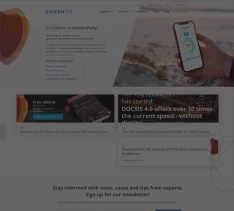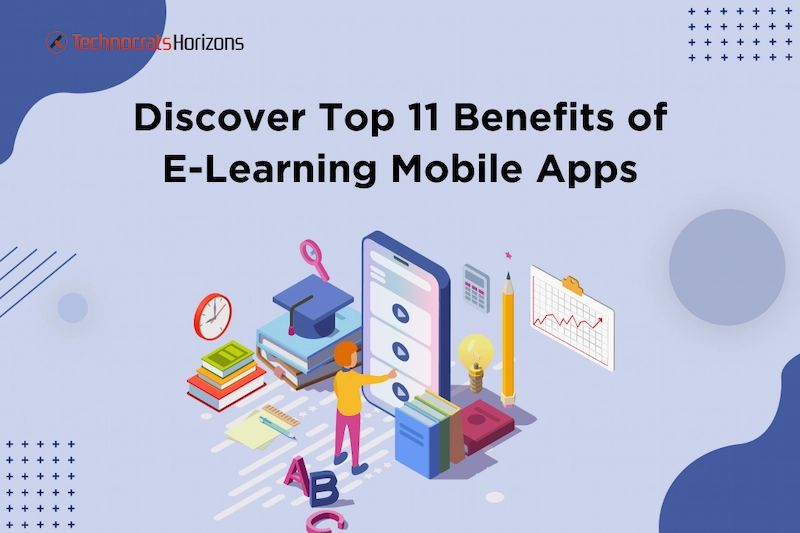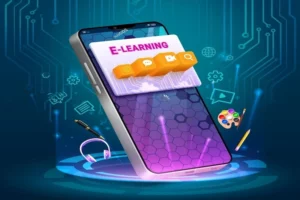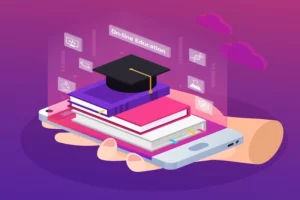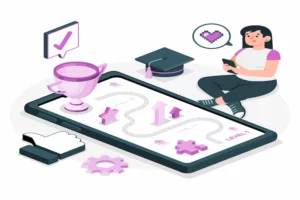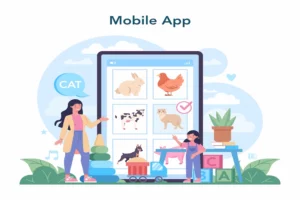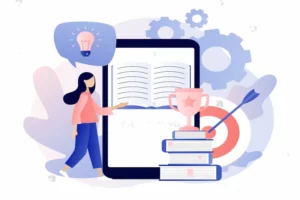Gone are the days when education was limited to the confines of the classroom. It has expanded beyond limitations and boundaries through many technologies. But none more powerful than mobile apps.
Even with a wide variety of apps available on the app store, selecting the right one for your child can significantly impact their learning process. Educational apps can enhance children’s understanding of different concepts.
Often, kids find books to be dull and challenging, but replacing them with lively pages and animated videos can make learning enjoyable. And this factor is a huge benefit for the education and training sector.
Education is no longer confined to classrooms; instead, it’s becoming accessible through mobile apps that fit right into students’ pockets. So, let’s discuss the biggest perks of mobile apps in education sector.
How E-learning Mobile Apps Are Reshaping the Way We Deliver Education?
Education forms the foundation of any society, underscoring the importance of properly educating our children to pave the way for progress. Just as we update our clothing, furniture, and mobile devices, we should also take the responsibility of modernizing our education system. It’s worth noting that our current educational system has remained unchanged for a century.
Despite the abundance of educational mobile applications, choosing the right one can potentially revolutionize how learners perceive the education journey. Educational apps are introducing a new level of enjoyment by simplifying complex concepts and making learning truly engaging.
The global e-learning is expected to reach $394.6 billion by 2025.
This stat alone is a testament to the scope of e-learning apps.
Top 11 Benefits of Mobile Apps in Education Sector
90% of students today are using smartphones to study. That’s why you need to have dedicated mobile apps but you must be wondering how it can benefit your business and students both. We’ve compiled a list of benefits of mobile apps in education sector below:
1. High Portability
Portability remains one of the most remarkable aspects of mobile phones, as we’ve previously mentioned. With a growing number of people having internet access and mobile apps capable of housing numerous books and study materials, utilizing these resources has become much easier. In the present times, learning is not confined to the classroom alone.
2. 24/7 Availability
Educational mobile apps offer accessibility 24/7, unlike traditional institutions. This means that learning is no longer bound by specific hours. Many students feel hesitant to ask questions in a classroom setting, but with an app, they can seek answers whenever they want and even rewind lectures to grasp concepts more clearly.
We also recognize that time-limited learning is ineffective, especially for children who can easily become distracted and struggle to maintain focus over extended periods. This is where educational apps excel, allowing students to learn new subjects at their own comfortable pace.
3. Communication Between Parents and Teachers
In discussions about improving performance, the concept of regular parent-teacher interactions is often emphasized, but the reality is different. Busy schedules make it challenging for both sides to maintain consistent face-to-face interactions. Thankfully, technology has come to the rescue. Through the powerful tool of smartphones, teachers can respond to parental inquiries anytime and anywhere. This fosters transparency regarding a child’s academic progress.
4. Adding a Playful Twist
Incorporating gamification into learning is an excellent strategy to maintain kids’ interest in their studies. Many subjects can seem challenging, but by presenting them in the form of games, they can become much more engaging.
Consider this example: using games to make learning new words and vocabulary enjoyable. Language learning apps leverage this approach to help learners grasp new terms and expand their vocabulary. Even competition and rewards motivate students to delve deeper into their studies. This method also kindles enthusiasm for subjects that may have previously felt daunting.
Want To Build Standout Digital Solutions? Choose Us!!
5. Sustained Learning Approach
The mobile learning process is sustainable in its approach. Engaging with a lesson through an app enhances learning effectiveness, as it promotes experiential learning rather than rote memorization. This shift aligns with a more holistic and practical approach to education.
6. Faster Updates
Certain apps are crafted not only to aid users in learning but also to help them stay updated on essential details such as alerts, schedules, and various campus events. Soon, these apps will facilitate payments related to education, such as tuition fees and library fines. Moreover, they provide opportunities for interaction with students at all stages of their academic journey, from prospective students to enrolled ones and even alumni.
7. Enhanced Academic Performance
One notable e-learning giant, Byjus, has completely elevated the classroom learning experience. The question arises: “How does it achieve this?”
By empowering every facet of the classroom, mobile apps can seamlessly take over the lesson, bringing an entirely distinct learning experience. Students gain swift access to supplementary materials, the ability to find answers promptly, and an overall improved classroom atmosphere.
For instance, once the lecture concludes, a student is at liberty to revisit the course material as many times as needed to foster a deeper understanding. This approach accommodates slower learners, as they can progress at their own pace without disrupting the rest of the class and do so independently.
8. Innovative Learning Approach
Traditional learning methods often evoke feelings of boredom. Many prefer to stick with the monotonous routine of using traditional books, missing out on the engagement aspect of the learning process.
Apps presented as technology offer a fresh approach for those eager to learn something new. These software applications bring novelty to the learning experience, combining it with enjoyable and engaging elements. Learning through apps encourages the active processing of information by the brain, leading to new perspectives through games or challenging tasks.
9. Environment-Friendly
As we move forward in the 21st century, more and more organizations are going eco-friendly to a sustainable future. In the world of education, mobile apps have an eco-friendly advantage. They require only a download, as opposed to the millions of trees that are cut down to produce paper for traditional learning methods. This shift towards mobile learning contributes to a greener planet, benefiting future generations.
10. Cost-Effective Solution
In contrast to on-campus and traditional classroom learning, educational apps, and mobile e-learning applications are remarkably cost-effective. This is where the concept of blended learning comes into play. You can leverage mobile educational software or e-learning apps to provide high-quality on-campus and remote instruction. In any scenario, it’s a budget-friendly and efficient approach that also yields significant investment.
11. Tech-Savvy Students
We have to accept the fact that we are living in a tech-dominated world. The earlier the kids adapt to it the better. Through educational mobile apps, kids can gain valuable technical abilities that not only help them navigate apps but also prepare them for using similar devices like tablets. This paves the way for improved tech-savviness among students especially those living in rural or less-privileged areas.
In Conclusion
With the aid of e-learning resources, navigating the sometimes challenging educational landscape has become smoother, and infused with elements of enjoyment. We compiled the most crucial benefits of mobile apps in education sector in this blog for you to reach more and more students.
Whether you’re in the education field or a parent, the desire to make learning enjoyable is shared. Collaborating with the right app development company is paramount.
Therefore, we have the best choice for you. Technocrats Horizons has the right expertise to provide an immaculate mobile app solution for you. Not just that, we have experience in delivering custom e-learning solutions for top brands.
Need Help With E-Learning Solutions? Choose Us!!
Get App Solutions That Immediately Stand Out!
Talk to our experts to understand how our app solutions can boost your productivity.


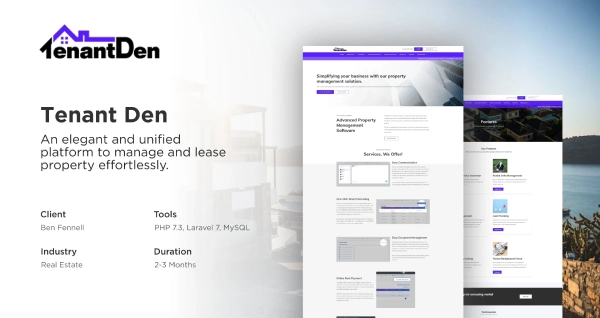







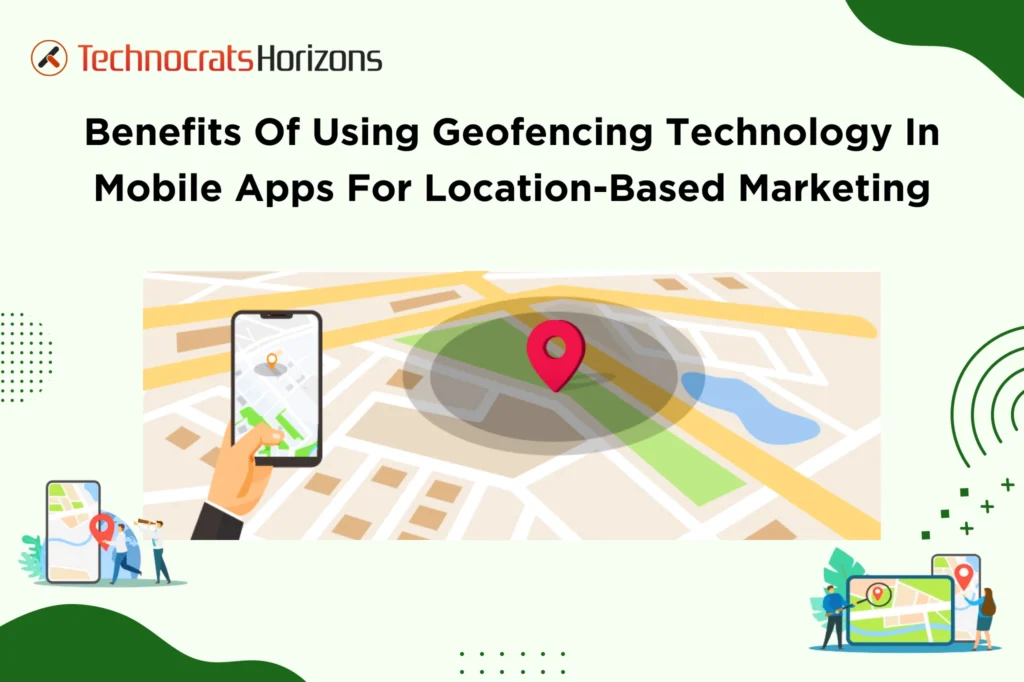
 Request a
Request a















